From the Open-Publishing Calendar
From the Open-Publishing Newswire
Indybay Feature
Stanford Community Speaks Out Against Animal Experiments
Stanford students and community members protest use of tens of thousands of animals in Stanford labs.
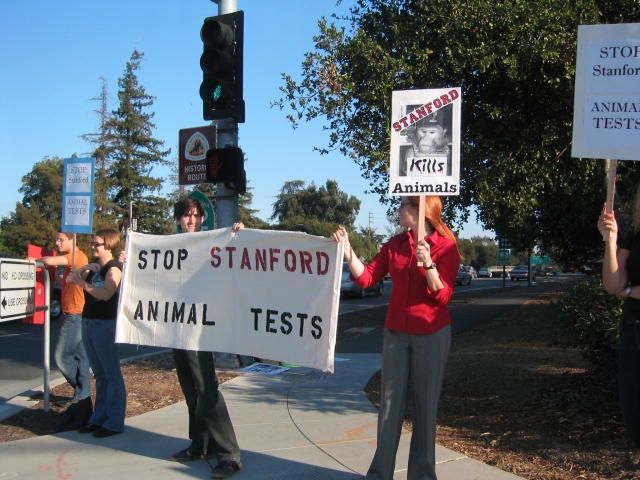
Bearing signs saying “Liberate Primates” and “Stanford Kills Animals,” Stanford University graduate students, undergraduates, law students, and community members protested the use of animals in experiments at Stanford’s Research Animal Facility (RAF) on Friday, October 21.
During a busy Friday rush hour that coincided with Stanford’s “Alumni Weekend,” the activists, members of Animal Rights on the Farm (ARF!), convened on El Camino Real, a major thoroughfare bordering Stanford University in Palo Alto. As passing vehicles honked enthusiastically in approval of the protest, the activists waived signs and distributed leaflets alerting drivers and pedestrians to the animal experimentation conducted on campus. The demonstration was held in commemoration of National Primate Liberation Week, and follows a recent on-campus press conference by Michael Budkie, executive director of Stop Animal Exploitation Now (SAEN). Budkie presented his group’s findings on animal research at Stanford. SAEN’s report details the use of hundreds of primates at the RAF, which ranks 21st nationally in terms of federal research dollars received.
Word of Friday’s demonstration reached some Stanford researchers. Several of the campus’s science buildings were closed early on Friday because of the protest. An email was sent to biology students notifying them of the closure, stating, “Due to a protest against research involving animals that has begun on campus, we have been advised to lock the Lokey building early today. The doors will automatically lock at 3:15.” According to another student, all the other biology buildings were also locked and were being patrolled by police officers. “We had no plans to protest at or near these buildings, so we’re a bit confused by this over-reaction. We also find it troubling that some Stanford researchers are threatened by free speech on campus,” said ARF member and Stanford Law School student Matthew Liebman. This is the third time the Stanford police have responded to peaceful and legal animal rights events, according to Liebman. A Stanford police vehicle with a windshield-mounted video camera also passed the protest on four separate occasions.
ARF! says it will continue to hold demonstrations against animal experimentation at Stanford until the administration agrees to its demands for transparency and accountability for animal tests conducted at Stanford. ARF! has submitted a letter to the University administration asking for a meeting to discuss animal research on campus.
According to a report (http://www.all-creatures.org/saen/res-fr-ca-su-aphis-2002.html) filed by Stanford in 2002 with the US Department of Agriculture (the agency charged with implementing the Animal Welfare Act), Stanford used the following animals for experiments: 32 dogs, 172 hamsters, 376 rabbits, 323 nonhuman primates, 110 sheep, 541 pigs, 2 goats, 9 ferrets and 471 gerbils (2,036 total animals). Because USDA does not require reporting on mice, rats, birds, and amphibians, the actual number of animals used at Stanford is much higher. Nationwide, rats and mice make up approximately 95% of animals used in research. Using this statistic, ARF estimates that Stanford’s RAF uses as many as 40,000 animals. The Research Animal Facility at Stanford University received over $146 million in federal funding in 2003 for animal experimentation, ranked 21st in the country.
Animal Rights on the Farm (ARF) criticizes, among other experiments, the following: one Stanford researcher systematically deprives mice, rats, and monkeys of sleep to determine the relationship between sleep deprivation, body weight, and energy expenditure (Role of Hypocretin in Metabolic Effects of Sleep Loss, NIH Grant #5R01MH073435-02); another separates infant primates from their mothers to test the resultant psychological effects (Maternal Availability and Postnatal Brain Development, NIH Grant #5F32MH066537-03); another induces anxiety and fear in parasite-infested rats (Parasite/Host Interactions and the Neurobiology of Fear, NIH Grant #1R21MH070903-01A1); another conducts gene-therapy research on the livers of rats, rabbits, and dogs (Transferring Integrase Technology to Animals, NIH Grant #5R01HL068112-05); another researcher has spent the last 15 years conducting invasive brain-imaging studies, maternal deprivation experiments, and stress studies in squirrel monkeys (Model of Hypercortisolism for Major Depressions, NIH Grant #5R01MH047573-14).
ARF has also gleaned the following information from the research facility’s newsletters: the labs’ “animal caretakers” filed over 421 morbidity reports in 2001 (Comparative Medicine News, Jan. 2002); the University maintains a colony of inbred mice, “obtained after 20 or more consecutive generations of brother x sister mating” (Comparative Medicine News, Dec. 1999); RAF has been infested with mites, which cause self-mutilation and “blisters, crusts and warty lumps on the ears, eyes and nose” (Comparative Medicine News, Apr. 2002); the facility’s euthanasia procedures include CO2 gassing, followed in some cases by exsanguination (bleeding to death), cervical dislocation, or decapitation, and “[t]horacotomy (making an incision into the chest cavity) after apparent death from CO2 is widely used as a way to ensure the irreversibility of the procedure.” (Comparative Medicine News, Oct. 2003).
For more information on the campaign against the Research Animal Facility at Stanford University, contact arfstanford [at] yahoo.com.
During a busy Friday rush hour that coincided with Stanford’s “Alumni Weekend,” the activists, members of Animal Rights on the Farm (ARF!), convened on El Camino Real, a major thoroughfare bordering Stanford University in Palo Alto. As passing vehicles honked enthusiastically in approval of the protest, the activists waived signs and distributed leaflets alerting drivers and pedestrians to the animal experimentation conducted on campus. The demonstration was held in commemoration of National Primate Liberation Week, and follows a recent on-campus press conference by Michael Budkie, executive director of Stop Animal Exploitation Now (SAEN). Budkie presented his group’s findings on animal research at Stanford. SAEN’s report details the use of hundreds of primates at the RAF, which ranks 21st nationally in terms of federal research dollars received.
Word of Friday’s demonstration reached some Stanford researchers. Several of the campus’s science buildings were closed early on Friday because of the protest. An email was sent to biology students notifying them of the closure, stating, “Due to a protest against research involving animals that has begun on campus, we have been advised to lock the Lokey building early today. The doors will automatically lock at 3:15.” According to another student, all the other biology buildings were also locked and were being patrolled by police officers. “We had no plans to protest at or near these buildings, so we’re a bit confused by this over-reaction. We also find it troubling that some Stanford researchers are threatened by free speech on campus,” said ARF member and Stanford Law School student Matthew Liebman. This is the third time the Stanford police have responded to peaceful and legal animal rights events, according to Liebman. A Stanford police vehicle with a windshield-mounted video camera also passed the protest on four separate occasions.
ARF! says it will continue to hold demonstrations against animal experimentation at Stanford until the administration agrees to its demands for transparency and accountability for animal tests conducted at Stanford. ARF! has submitted a letter to the University administration asking for a meeting to discuss animal research on campus.
According to a report (http://www.all-creatures.org/saen/res-fr-ca-su-aphis-2002.html) filed by Stanford in 2002 with the US Department of Agriculture (the agency charged with implementing the Animal Welfare Act), Stanford used the following animals for experiments: 32 dogs, 172 hamsters, 376 rabbits, 323 nonhuman primates, 110 sheep, 541 pigs, 2 goats, 9 ferrets and 471 gerbils (2,036 total animals). Because USDA does not require reporting on mice, rats, birds, and amphibians, the actual number of animals used at Stanford is much higher. Nationwide, rats and mice make up approximately 95% of animals used in research. Using this statistic, ARF estimates that Stanford’s RAF uses as many as 40,000 animals. The Research Animal Facility at Stanford University received over $146 million in federal funding in 2003 for animal experimentation, ranked 21st in the country.
Animal Rights on the Farm (ARF) criticizes, among other experiments, the following: one Stanford researcher systematically deprives mice, rats, and monkeys of sleep to determine the relationship between sleep deprivation, body weight, and energy expenditure (Role of Hypocretin in Metabolic Effects of Sleep Loss, NIH Grant #5R01MH073435-02); another separates infant primates from their mothers to test the resultant psychological effects (Maternal Availability and Postnatal Brain Development, NIH Grant #5F32MH066537-03); another induces anxiety and fear in parasite-infested rats (Parasite/Host Interactions and the Neurobiology of Fear, NIH Grant #1R21MH070903-01A1); another conducts gene-therapy research on the livers of rats, rabbits, and dogs (Transferring Integrase Technology to Animals, NIH Grant #5R01HL068112-05); another researcher has spent the last 15 years conducting invasive brain-imaging studies, maternal deprivation experiments, and stress studies in squirrel monkeys (Model of Hypercortisolism for Major Depressions, NIH Grant #5R01MH047573-14).
ARF has also gleaned the following information from the research facility’s newsletters: the labs’ “animal caretakers” filed over 421 morbidity reports in 2001 (Comparative Medicine News, Jan. 2002); the University maintains a colony of inbred mice, “obtained after 20 or more consecutive generations of brother x sister mating” (Comparative Medicine News, Dec. 1999); RAF has been infested with mites, which cause self-mutilation and “blisters, crusts and warty lumps on the ears, eyes and nose” (Comparative Medicine News, Apr. 2002); the facility’s euthanasia procedures include CO2 gassing, followed in some cases by exsanguination (bleeding to death), cervical dislocation, or decapitation, and “[t]horacotomy (making an incision into the chest cavity) after apparent death from CO2 is widely used as a way to ensure the irreversibility of the procedure.” (Comparative Medicine News, Oct. 2003).
For more information on the campaign against the Research Animal Facility at Stanford University, contact arfstanford [at] yahoo.com.
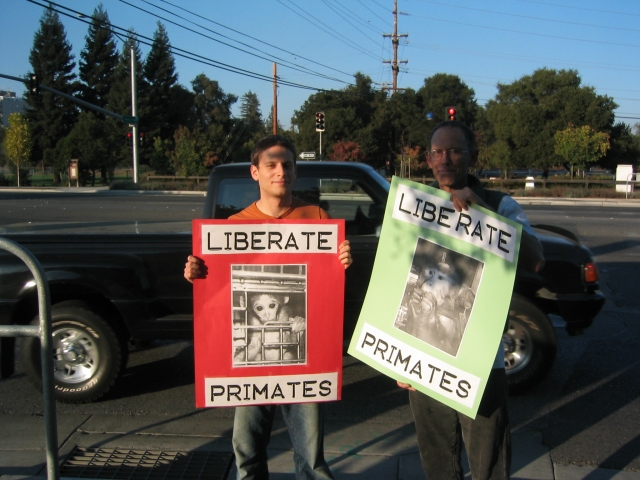
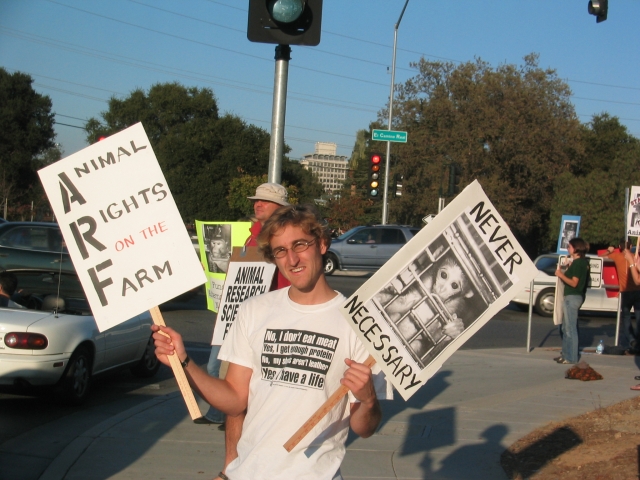
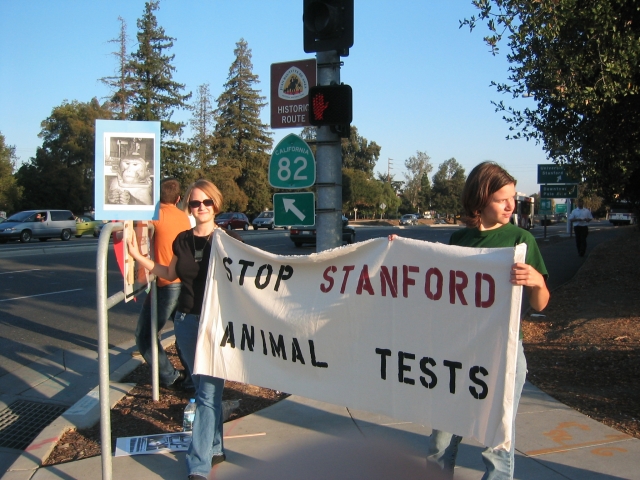
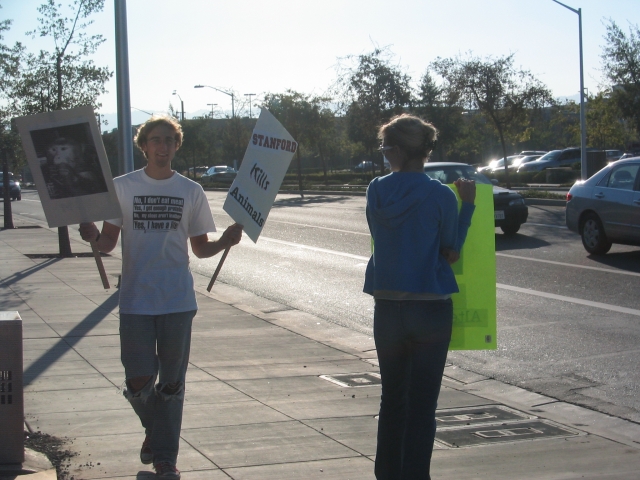
Add Your Comments
Latest Comments
Listed below are the latest comments about this post.
These comments are submitted anonymously by website visitors.
TITLE
AUTHOR
DATE
brilliant!
Tue, Feb 14, 2006 12:04PM
the truth
Fri, Feb 10, 2006 12:57AM
Mr
Sun, Oct 30, 2005 4:29AM
shut down primate research
Tue, Oct 25, 2005 8:52AM
Ms
Tue, Oct 25, 2005 5:05AM
;
Mon, Oct 24, 2005 2:24PM
We are 100% volunteer and depend on your participation to sustain our efforts!
Get Involved
If you'd like to help with maintaining or developing the website, contact us.
Publish
Publish your stories and upcoming events on Indybay.
Topics
More
Search Indybay's Archives
Advanced Search
►
▼
IMC Network


